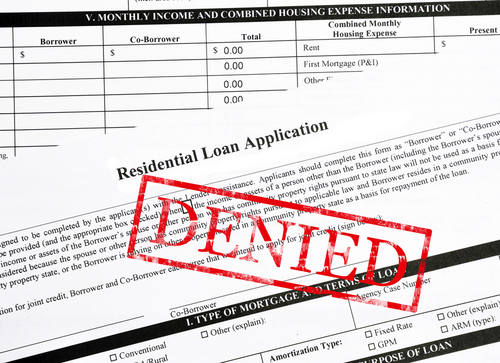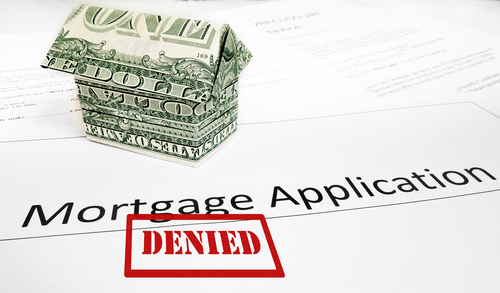What to Do When You Are Denied a Loan
Investing in real estate is a great way to earn passive income and potentially build wealth. But what if you’re denied a loan while attempting to buy a property? It’s important to know what lenders look for in applicants, understand why you might get denied, and alternative options to explore. Read along to learn more!

Contents of This Article:
- Standard Loan Qualification Criteria
- Reasons for Being Denied a Loan
- What to Do When You’re Denied a Loan
- Do You Qualify for a Hard Money Loan?
- Find a Hard Money Lender Near You
Standard Loan Qualification Criteria
If you’re looking to invest in real estate, you’ll want to figure out how you’ll finance your investment. Many people start by looking at traditional financing, which includes getting a mortgage loan from a bank or lending institution. Otherwise, you can explore alternative residential hard money lenders in Maryland. That said, while each lender is different, you’ll likely have to meet the following loan qualification criteria.
- Credit Score- Lenders usually use credit scores to assess the borrower’s creditworthiness. Most lenders look for a score of 620 or higher.
- Income- It’s important to ensure that borrowers have a stable and sufficient income so they’re able to repay the loan. So, lenders may ask for proof of income through pay stubs, tax returns, or bank statements.
- Employment History- A stable employment history can be important for loan approval. Some lenders may look at how long you’ve been with your current employer and your overall work history.
- Debt-to-Income Ratio (DTI)- Your debt-to-income (DTI) ratio compares your monthly debt payments to your gross monthly income. Lenders use it to assess your ability to manage your existing debt along with the proposed new loan.
- Down Payment- For certain types of loans, like mortgages, lenders may require a down payment. That said, the size of the down payment can affect loan terms and eligibility.
Reasons for Being Denied a Loan
Sometimes, even if you think that you meet the requirements, you can get denied a loan. That said, it’s important to understand why you may be denied so you can avoid future denials. Here are some of the most common reasons for being denied a loan.
- Low Credit Score

- Insufficient Income
- Unstable Employment History
- High Debt-to-Income Ratio
- Recent Late Payments or Defaults
- Limited Credit History
- Errors on Credit Report
Low Credit Score
A low credit score is typically a significant factor in loan denials. Most lenders use credit scores to gauge an individual’s lending risk. That said, late payments, defaults, and high outstanding debt levels can contribute to a lower credit score.
Insufficient Income
A lender may deny your application if your income is deemed insufficient enough to cover the loan payments. Having more than enough income to cover your existing debts is crucial before taking on a new loan.
Unstable Employment History
Lenders prefer borrowers with a stable employment history, as it provides assurance that the borrower has a consistent income to repay the loan. Frequent job changes or periods of unemployment may raise concerns.
High Debt-to-Income Ratio
A high debt-to-income (DTI) ratio can indicate that a significant portion of your income is already committed to existing debt payments. As such, lenders may be reluctant to approve a loan if you have too much debt and not enough income to cover it all.

Recent Late Payments or Defaults
If you have recent instances of late payments, defaults, or other negative marks on a credit report, it can lead to loan denial. Lenders may view these as signs of financial instability, making a loan more risky for them to take on.
Limited Credit History
A limited or short credit history may make it challenging for lenders to assess a borrower’s creditworthiness. So, without a sufficient credit history, lenders may be hesitant to extend a line of credit, especially for a large purchase like real estate.
Errors on Credit Report
Inaccuracies on a credit report, like incorrect personal information or other errors that negatively affect your application, can lead to a denial. As such, borrowers must regularly review their credit reports to identify and dispute any errors.
What to Do When You’re Denied a Loan
If you’re denied a loan, it’s important to take action steps to ensure it doesn’t happen again. Here’s what you should do once you’ve been denied a real estate loan.
- Understand Why You Were Denied- First, ask your lender why your application was denied. Under the Equal Credit Opportunity Act, lenders must disclose their reasoning for denying your loan application as long as you inquire about it within 60 days.
- Improve Your Financial Situation- If your application was denied due to a poor credit score, high DTI ratio, or insufficient income, you’ll want to improve these things before applying for another loan.
- Consider Alternative Lending Solutions- Know that a traditional mortgage loan isn’t your only option for real estate investing. Alternative solutions, like hard money loans, are great options for investors who don’t qualify for traditional financing.
Do You Qualify for a Hard Money Loan?
Qualifying for a hard money loan is fairly easier than obtaining a traditional mortgage loan. The requirements for hard money loans are typically less strict than those for conventional mortgage loans. Additionally, the process for obtaining a hard money loan is usually much faster than getting a traditional mortgage loan from a bank.

However, most hard money lenders still have criteria they look for in borrowers to determine a fair loan amount. For instance, they’ll still look at your credit, although it may not hold much weight in their decision. For the most part, they’re interested in determining the value of the property you’re using as collateral.
Additionally, they’ll look at other factors like your real estate experience or how much you’re willing to use as a down payment. Most lenders like to see that investors have prior experience with loans and buying properties, and many expect a sizable down payment.
Find a Hard Money Lender Near You
If you’ve been denied a loan or don’t qualify for traditional financing, you may want to look into a hard money loan. Hard money loans are non-conventional, asset-based loans that investors can use to secure quick real estate deals.
Looking for a hard money loan near Maryland? Look no further than Maryland Hard Money Lenders. Our team of experienced professionals can help you secure a loan quickly and efficiently. Contact us or fill out our initial loan application today to learn more!



